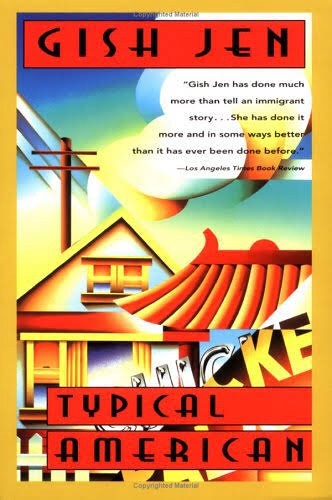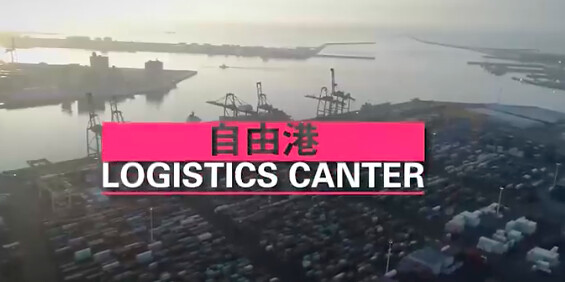So, if you're like and don't have a TV, so can't necessarily watch something when it's on TV, you may be disappointed in the 4 minutes or so of footage across two videos of President Tsai's CNN interview on CNN's official feed.
The good news is that an awesome guy I don't know is here to help! You can watch the full video here.
Apparently two well-known analysts in Taiwan went in on ICRT about the interview (one thinking positively of it, the other negatively), though I haven't listened to the whole thing yet.
I have a few thoughts myself. Tsai herself, in my opinion, performed admirably. To a Western audience - the people this is actually aimed at - she came across as reasonable, pragmatic, even-keeled and intelligent (all things she truly is). She made a very strong case for Taiwan as a beacon of democracy and freedom, and was very clear on the threat from China and why it should matter to the world, without any 'troublemaking' rhetoric. More time could have been spent on marriage equality - as far as I can tell, it wasn't mentioned - though I may have just missed it - to really hammer home the idea of Taiwan as 'liberal beacon in Asia' (it's not that liberal by Western standards but by Asian standards, it kind of is). She also makes a strong case for closer communication and stronger relations with Taiwan, without seeming desperate or begging.
She makes it clear that Taiwan does have its own military capability and can withstand a first wave of attacks. This is essential - we need to show the world that Taiwan does take its defense seriously and would not simply beg the world to defend it as it stood by, helpless and unwilling to stand up for itself.
"If it's Taiwan today, people should ask, 'who's next'?" - I truly don't think one can make a stronger case, and it was delivered succinctly and clearly.
Her point that Taiwan is the only democracy in the Chinese-speaking world, and it produced a female leader, so we need to quit it with thinking women are limited in what they can do is a strong one. By going meta with the 'questions about being a female leader of a country' trope and acknowledging it, with her basically saying 'what I think about such questions don't matter, I have an obligation to answer them until female leaders are totally normalized' (paraphrased), she shows that she always considers her role carefully as a leader rather than giving in to her personal feelings. To Americans who may be sick of seeing the puerile, vengeful, personal spewings of their own president, this is likely to play well.
She showed that she does speak fluent English, but wisely moved back to Mandarin for the more complex questions. This will also play well to a Western audience.
Tsai is quite good at this kind of interview, where she almost certainly prepares careful responses to known topics in advance, and where a questioner prompts her on various topics so she doesn't get too bogged down in technocratic wonkery.
I'll admit that by giving careful answers that kind of evade the meat of the questions asked - on whether Taiwan counts on US support in the face of a Chinese invasion, on whether Trump is an unreliable ally - she does come across as just another 'politician' to some extent. She doesn't really answer these questions, and I would have liked a stronger stance on Taiwanese not favoring unification, now or ever. That said, I think any half-intelligent viewer will understand that her country is in a precarious position. In a situation where a single misplaced word can infuriate China, her 'careful' approach is simply necessary.
All that said, the average Westerner interested enough to watch this interview would, in my estimation, be persuaded that Taiwan is worth taking seriously and its leader is not an 'extremist', an 'ethnic nationalist/separatist' or a hotheaded despot, but the pragmatic, serious, hard-headed and slightly nerdy (okay, very nerdy - that karaoke comment about reading while her friends sang...wow) democratically elected leader of a proud, free society.
That doesn't mean I feel so positive about the whole interview. While I am very pleased with how Tsai presents herself, I'm less of a fan of the historical interludes about the Taiwan-China situation, and some of the language that the interviewer used (namely the terms "reunification" and "mainland").
No one thing the presenter said was wrong, regarding what happened in 1949, the change in diplomatic ties, that Taiwan's official name is the Republic of China, or who the US recognizes as 'the sole China' now and why. No one fact was off-base.
But taken together, it presents an image of Taiwanese history that I can't endorse as accurate: there are several lies of omission that seem like minor details but are in fact pivotal to an accurate telling of Taiwan's story. If included, such details would change the overall narrative of Taiwanese history to such a great degree that leaving them out feels false.
Imagine if, instead of the usual "1949", "two Chinas", "the Republic of China still claims" narrative without any key details, the presenter had said something like this:
"Taiwan had been a Japanese colony until the end of World War II, when the Allied Powers allowed the Republic of China to accept Japan's surrender on their behalf and govern Taiwan, amid some controversy. The Nationalists and their leader, Chiang Kai-shek, who controlled Republic of China, were then defeated by the Communists under Mao Zedong, who founded the People's Republic of China. The Nationalists fled to Taiwan, claiming to be the 'sole' government of the 'true' China. Both leaders of these "two Chinas" were military dictatorships marked by oppression and mass murder. The United States recognized the Republic of China on Taiwan, under Chiang Kai-shek, until the late 1970s, when it switched recognition to the PRC in Beijing. Since then, China has continued on a trajectory of dictatorship while Taiwan has democratized and liberalized, with many Taiwanese no longer identifying as 'Chinese'. Polls in Taiwan show consistent support for a separate Taiwanese national and cultural identity. Some in Washington say that in light of this, it's time to re-assess US policy in the region, which..."
Same basic facts, but with pertinent details centered in the narrative, it tells quite a different story, doesn't it?
But, hey.
We can't get everything we want, so I can only hope that during the 'historical' interludes, American viewers went to the kitchen to get more chips.
In the end, it doesn't matter as much as Tsai comporting herself well, which she clearly did. Taiwan needs to present a clear case to the world that it is worth taking seriously and aiding if necessary. I never thought I'd say Tsai Ing-wen was the public speaker who could accomplish much of anything (she's not a great speaker), but...I could be wrong. She's exactly the face Taiwan needs to show to the West.
Showing posts with label china_sucks. Show all posts
Showing posts with label china_sucks. Show all posts
Monday, February 25, 2019
Sunday, February 17, 2019
Where Richard Bush is right, and where he is wrong
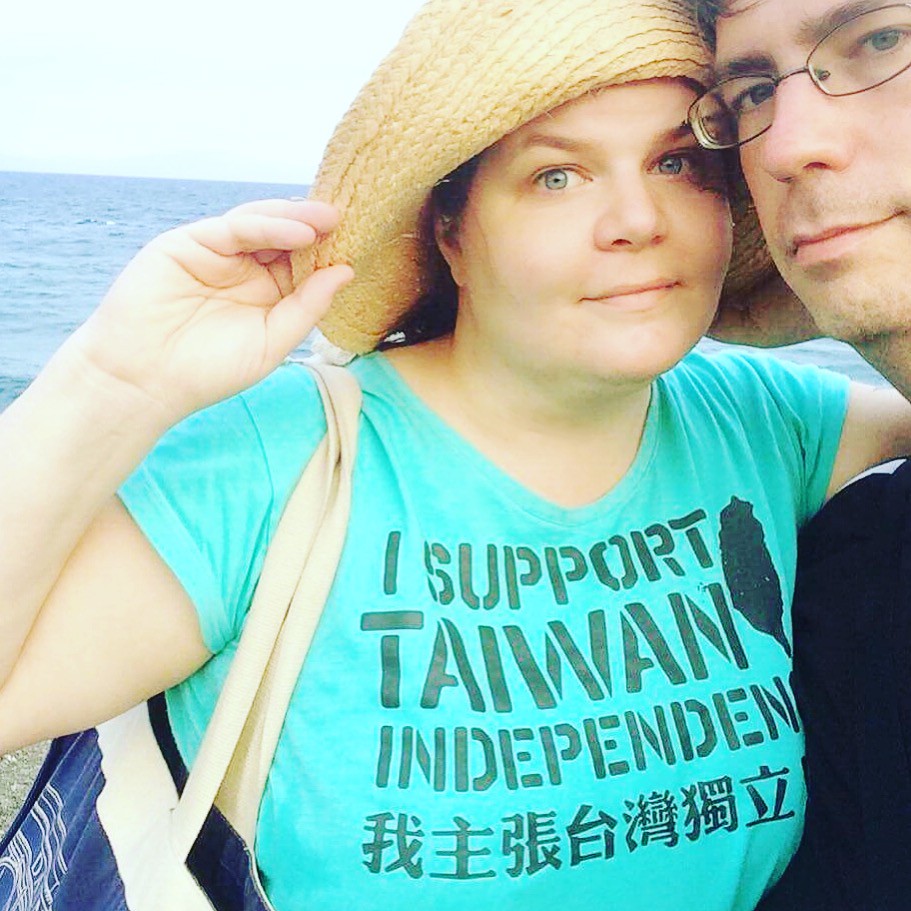
Let me start out by saying that I don't think China expert (which somehow includes Taiwan? I mean, being the former AIT chair makes that okay, but they are not the same thing) Richard Bush is a Confucius McDoorknob. We can all agree that he is deeply credible.
So, let me be kind, and start with the ways that his two most recent articles (here and here) are right, before talking about the ways that they aren't.
In the first article, he's quite right that Tsai has been doing an excellent job of managing cross-strait relations, using caution most of the time, but snapping back like a bad-ass she-wolf at the appropriate times. This is just right, and Bush and the US are right to support her:
In my view, one of the reasons that the United States has expressed support for President Tsai and her administration is precisely because she is cautious and careful. She does not take the U.S. commitment for granted and understands the value of close communication.
He's also right that a referendum on de jure Taiwanese independence is a terrible idea.
Frozen Garlic covered why referendums are not the direct-democracy saviors their supporters make them out to be in the context of energy policy; it really covers referendums as a problematic tool more generally, though, and I highly suggest reading it.
Echoing Froze, Bush points out:
When it comes to democratic mechanisms, none is perfect in my view. Whether it is indirect democracy in a legislature or direct democracy through a referendum, distortion and manipulation of the popular will occurs. So a referendum is not necessarily better than other mechanisms.
If referendums are to be employed on routine policy issues, in my view, they should be crafted in a way so the result truly reflects the view of the majority of all citizens. I’m not sure one can say that about the referendums that were held on November 24 last year.
All the more so when the referendum is on questions regarding the fundamental identity of a state and a nation. For these, it is a good thing to set a high bar for authorizing a referendum and passing a referendum. The stakes are so high and the consequences of being wrong are so great, that it is appropriate—even mandatory—to require a broad public consensus through a super-majority for passage. Witness the trouble that Great Britain is now in because only a simple majority of those voting for Brexit was required for passage.
There are other reasons why it's a bad move, as well: first, that it would take a willfully blind person or someone invested in an outcome they are not openly articulating to say that Tsai is not working toward setting the fundamentals in motion for eventual de jure independence. It's not even reasonable to say she's moving too slowly; this is the pace you have to move at when you are threatened by a nasty bully just a few hundred miles away with missiles pointed at you.
It doesn't take a genius to understand that Taiwan has to make choices based in its real situation, not in how it would like the world to be right now.
The only reasonable criticism, then, is that she's not doing a particularly good job of 'selling' her way of doing things to the public. I do understand this is difficult: the deep blues already think this is the GREEN TERROR (it's not, and that phrase doesn't mean anything) and the deep greens are in fantasyland - they'd rather do what feels good than work in concrete ways toward a future for Taiwan. But it does feel as though she hasn't really tried.
So to say that what's needed is a bing-bam-boom REFERENDUM! goes beyond wishful thinking - in some ways it's straight-up childish.
And, of course, it's a bad move because it will probably fail. I mean, look at how easily the tide turned on the referendum to end the use of "Chinese Taipei" (which realistically would have meant applying to stop using that name - there's no way it would have been accepted). All it took was the IOC being a bunch of whiny buttclowns and the Taiwanese Olympic athletes coming out against the change to get the Taiwanese not to vote for a referendum that would have symbolically told the world that they think "Chinese Taipei" is a preposterous name, which it objectively is.
If we can't even pass "what the hell is Chinese Taipei?", how are we going to pass this? We're not. That doesn't mean the Taiwanese electorate doesn't generally support independence; most people do.
And, as much as I hate to admit it, he's right about Taiwan having to take into account the political situation in the US and what they will and will not realistically offer Taiwan.
Yeah I know I just puked in my mouth saying that too, but it doesn't make it untrue.
From the "open letter":
I do not know how firm the Trump administration’s commitment to Taiwan’s defense would be if military conflict were likely. There are certainly those who see Taiwan as a useful asset in its campaign to resist what they regard as China’s revisionist objectives. But valuing Taiwan’s partnership in this way is not the same thing as giving Taiwan, or political forces in Taiwan, a green light to act unilaterally to change the status quo, a principle that remains a central element of U.S. policy.
I do know that President Trump himself is skeptical about any U.S. security commitment to Taiwan. At a meeting of the National Security Council on January 19, 2018, Mr. Trump asked his senior national security team, “even more than [Korea], what do we get from protecting Taiwan?” The implication of that question is the U.S. commitment to Taiwan is not justified, as far as he is concerned. I have seen no evidence that this skepticism has changed. It is consistent with his long-standing opposition to U.S. defense commitments to U.S. friends and allies.
and from the "let's not invite Tsai to speak" article, which I think was easily the worse of the two:
Make no mistake: The United States should continuously find ways to improve relations with Taiwan. We need to improve our economic relationship and help Taiwan effectively enhance its deterrence against China. That requires engaging Taiwan leaders on how they realistically believe American can help them, not how we think we should help. Forty years of American experience in conducting U.S.-China relations has demonstrated the need to be skillful and sometimes stealthy in our Taiwan diplomacy. Public symbols, deftly deployed, are important in relations with Taiwan, but substance is far more important.
In short, when talking about how to improve the chances of a truly independent future for Taiwan, it is simply smart to consider the US position as Taiwan's most powerful potential ally. I don't like it any more than you do, but whether or not the US will ultimately stand up for Taiwan does matter. At the very least it forces Taiwan to consider what it has at its own disposal when making decisions rather than assuming that its underdog status is so sympathetic and its cause so just (though it is) that of course anyone who truly cares about a free and democratic world will, in the end, stand by us. But that is not at all assured. It's not right and it's not fair, but it is sadly true.
And, of course, he was smart to point out that the call to invite Tsai to address Congress originated with a group of US Senators, and it's not clear that Tsai herself thinks its a good idea:
The third flaw in this initiative is its disregard for Taiwan’s view. I’m guessing here, but I suspect that the authors did not ask President Tsai if she thought this was a good idea—and, if they did ask, they didn’t listen very carefully to her answer. President Tsai is responsible for the prosperity and safety of 23 million people. She understands that she must maintain some degree of balance between relations with the United States on the one hand and relations with China on the other. Clearly, relations with China are not as good as she might like them to be, but I believe she would not wish to risk a further, serious deterioration in relations with Beijing unless it brought it an extraordinary benefit.
But I have to say, there are a lot of ways in which Bush is straight-up dead-ass what-the-hell wrong.
Starting with the quote above, what's up with the fallacy that Tsai can do much, if anything, about deteriorating relations with Beijing. They're going to treat Taiwan like garbage no matter what she does because they simply don't like her, the DPP, or the Taiwan consensus. Relations are deteriorating because Beijing is deteriorating them, and that's not going to change.
Along these lines, and alongside some pretty solid wisdom, Bush is also selling some Grade A snake oil. Reading these articles is like going to your Harvard-educated doctor who effectively treats an infection with modern medicine, and then recommends you get your humors balanced.
Let's start with the top shelf dippery:
The first aspect is that the proposal touches on the national interests of the United States, specifically its abiding interest in peace and security in the Taiwan area and its longstanding view that neither side of the Taiwan Strait should try unilaterally to change the status quo.
and:
You will recall that President Bush publicly criticized Mr. Chen in December 2003 for trying to unilaterally change the status quo. In September 2007, then-Deputy Assistant Secretary of State Thomas Christensen warned that Mr. Chen was putting Taiwan’s security at stake for the sake of the DPP’s electoral advantage.
These points pre-suppose that the status quo can potentially be changed bilaterally, or in some way other than unilaterally (and that the DPP fights the status quo "for its electoral advantage" rather than because they, and most Taiwanese, actually believe in working toward an independent Taiwan).
This is false.
It's not only false, it's dangerous to buy into. It will never happen. There's no game to play here, no potential winning strategy in which, if Taiwan negotiates with China in just the right way, or plays nice to just the right CCP officials, that there will be a breakthrough and a permanent situation of peace and Taiwan's assured autonomy would tumble from the heavens, rejoice!
China. Will. NEVER. Agree. To. A. Bilateral. Solution. That. Taiwan. Can. Accept.
Ever.
Well, unless the CCP falls in an inglorious revolution, but that would create so much instability and uncertainty (a dying CCP who invades Taiwan as a last-ditch effort to distract its own people from the situation about to boil over at home?) that it's not exactly desirable either. Slow reforms and so-called "bloodless" democratization/liberalization are even less likely, at least not on any timeline that will be viable.
That leaves three possible solutions that Bush is assiduously trying to avoid admitting to:
a.) war
b.) perpetual status quo
c.) some non-war-starting way of unilaterally changing the status quo
(The idea of peaceful unification is as much a non-starter as China agreeing bilaterally to Taiwanese independence: Taiwan would never accept it).
War is possible, but quite wisely, nobody (except perhaps China) wants to pursue it, so let's leave it aside. The perpetual status quo is a chimaera. It seems real enough but can't last. There's just no way that Taiwan's current situation is permanently tenable. This is because while the CCP as a whole may not be in any great rush to try to annex Taiwan, Xi Jinping harps on it in a way reminiscent of Chiang Kai-shek before anyone took him seriously. It seems unlikely to me that he'll run China for the rest of his life without at least making an attempt to accomplish it. And yet, the Taiwanese overwhelmingly support independence (whether de facto or de jure). They may vote for politicians who say otherwise, for other reasons, but when those politicians make concrete moves towards integrating with China, watch how their fortunes change.
So what does that leave us? Option C. I have no idea how we cause that to come about, but seeing as I don't see any "bilateral" way of changing anything between Taiwan and China, we can't take any potential future unilateral action off the table.
That Bush wants to imply that this is not Taiwan's reality, and that a bilateral solution may be possible, is dangerous wishful thinking at best, and straight-up snake oil served by gaslight at worst.
And, while I appreciate that Taiwan must take the US's position into consideration, I balk at the implication that we should prioritize the US-China relationship as though it is somehow more important to Taiwan than the question of its own continued sovereignty:
If the president of Taiwan were to speak to a joint meeting of Congress, any U.S. claim that its relations with Taiwan were unofficial would ring completely hollow. China would interpret the move as Washington’s reneging on the fundamental bargain at the heart of U.S.-PRC relations. Although I cannot predict exactly what Beijing would do in response, a radical downgrading of the relationship would be likely. Any hope that President Trump would have of cutting a trade deal with his New Best Friend Xi Jinping would vanish. U.S. requests for Chinese assistance concerning North Korea would fall on very deaf ears. Many sectors of American society that still value the U.S.-China relationship would be hurt. American multinationals that rely on China as a market or production platform would be vulnerable to retaliation, with attendant effects on jobs and profits.
Yeah okay but now you're starting to make it sound as though US corporate profits are Taiwan's chief concern, or that we should be worried about the US-China relationship for its own sake, beyond what it portends for the US-Taiwan relationship (or the Taiwan-China relationship).
We don't. I don't care about a trade deal between the US and China beyond its potential impact on Taiwan, and I don't care about the "fundamental bargain at the heart of US-China relations" because it's a crap bargain. I want US to normalize and make official relations with Taiwan, so why would any Taiwan-prioritizing readers take this paragraph seriously?
I mean, I get it, this is aimed as much at a US political audience as a Taiwan one, but as someone who prioritizes Taiwan, it is deeply unconvincing. Poor babies. It might hurt your profits. Oh noes. Oh wait, I don't care.
Finally, I'll also say that this simply can't be argued with, but is still deeply problematic for reasons explained below:
Also, neither you nor I can control how the Beijing government interprets developments on Taiwan and whether they trigger Article 8 of the Anti-Secession Law.
What bothers me about it is that he comes so close to understanding a deeper truth about China: that they are going to treat Taiwan like crap no matter what, and Taiwan can't control that (the US, in theory, could influence it in some way - if it wanted to. It doesn't.)
But no, he stops there, and then promptly trots out the same old blather implying that Taiwan not only can, but should, play this game with China:
The second flaw in this proposal [for Tsai to address Congress] is Taiwan would suffer. This initiative began in the United States, and Beijing would take the opportunity to pressure and squeeze Taiwan even more than it is already doing. It would likely find ways to get the small number of countries that still maintain diplomatic relations with Taipei to switch to the PRC. Taiwan-directed exercises by China’s People’s Liberation Army would intensify. China’s efforts to interfere in Taiwan’s domestic politics would increase. So, a gesture that senators intended to help Taiwan would only hurt it.
Taiwan is going to "suffer" no matter what. China will "squeeze" Taiwan no matter what. They will try to poach our (well, the ROC's) diplomatic allies no matter what (and I'm not sure how much I care - it's not like those countries recognize Taiwan. They recognize the ROC as China, which is not the same thing really). Taiwan-directed exercises by the PLA will probably intensify no matter what, and Xi's anti-Taiwan rhetoric will escalate no matter what. So while I admire Bush's genuine concern for Taiwan, he's coming at it in not only a wrong, but condescending way - as though we don't see for ourselves that China is already doing the things he is threatening China will do.
Let me repeat:
China is going to increasingly treat Taiwan like garbage no matter what Taiwan does, and there is nothing acceptable to the Taiwanese electorate that Taiwan can do to stop it.
So if the CCP is going to continue to be a bunch of glass-hearted pissbabies, and they are going to increase their bullying of Taiwan regardless, then dude.
Let them.
And don't buy into the illusory nonsense that if Taiwan just plays footsie in the right way, it can negotiate a better outcome for itself or somehow convince China to stop being such a jag-off. This will never happen.
The only way to win this game is not to play. I support Tsai because, while it looks like she's playing China's game, she in fact has her own deck of cards and is playing her own long hand. China's not even invited to the poker table.
So let's keep not playing. Let's not make any rash moves, and let's stop tearing ourselves apart because some people need to prove that they are more ideologically "pure" rather than seeking realistic, practical solutions that lay the groundwork for a future that includes an independent Taiwan.
But holy mother of god, let's not buy any "but China will be mad and you can't make any unilateral changes!" garbage.
We know better and we will not be fooled.
Monday, February 11, 2019
Making a fuss is worth it: IELTS gets a well-deserved smack for calling Taiwan "China"
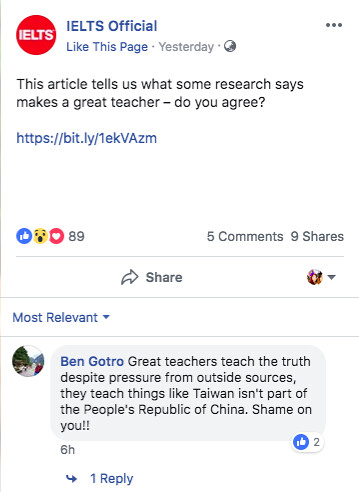 |
| I was banned from commenting on IELTS's Facebook page because they're a bunch of dictator-loving pissbabies, but I'm glad to see others taking up the fight. |
Recently, 46 members of the UK Parliament came together to castigate the International English Language Testing System (IELTS) for changing its designation of "Taiwan" to "Taiwan, China" on its website and admonish them to revert to the original wording. The charge was led by legislators from the UK's version of the Taiwan caucus, and to be frank, is a breath of fresh air in a world that seems all too happy to sell out to China.
While it's highly unlikely that any of them read my post, my other post or my husband's (better) post on this topic, I do think it's worth it to make a stink, even in the tiniest way. As a friend pointed out, all that accumulated stink can sometimes build up to something, and cause people with real power to take action.
And all I can say is that I'm annoyed that my own country's government didn't, as far as I know, do anything similar when TOEFL made the same change.
And that's just the thing - the hardest part of advocating for Taiwan is being utterly powerless. When a major testing organization, which is meant to be apolitical (as language proficiency testing shouldn't have blatant political biases) makes such a political move for obviously profit-driven motives, a lot of damage is done. The more organizations with 'prestige' give in to China's demands for how to refer to Taiwan, the likelier it is that everyday people around the world will see that wording and just automatically file 'Taiwan' under 'a part of China' - and there's very little that people like me can do about it or only a very limited sphere in which we can raise a fuss. Or worse, if the topic ever comes up, they'll point to organizations like IELTS and say "oh, look - but IELTS calls it China, so there must be something to that!" and stop listening to reason when people like me, who as individuals don't have the cachet of a generally well-respected organization, point out the clear issues with such logic.
It's also simply psychologically damaging to Taiwanese people, who have to see their country referred to as "China" all over the place, with very little recourse and no warning as to when it might happen or where it might pop up.
These things do matter - the war over what things are called, what language is used. When every major company, organization and website calls Taiwan "China", people start thinking of Taiwan as, well, China.
It's also difficult to keep up the fight because, to be honest, we lose so goddamn often. It's brutal, it's neverending, it's a psychological beatdown (which is part of the reason why China does it). It's really a thing of beauty to see that we cut deep on this one, and perhaps (perhaps?) a group of MPs will be able to accomplish what people like me simply cannot. Do I dare hope for more? Reader, I dare: perhaps this isn't just a speck of light on a bleak horizon when it comes to IELTS, but a sign that the tide could turn.
And, of course, it's personally challenging as well. As I've written, I have some work through IELTS, the nature of which I'm not allowed to publicly reveal (of course, by telling you that, I've essentially revealed it, and since I'm furious at IELTS, I don't even care.) Fighting this has taken a toll on my income, as I now sign up to do work for them as little as possible, when I used to do it pretty regularly, for pretty decent pay. I had to proactively decide that principles were more important than cash, and I was privileged to even have the choice open to me. It stands to hurt my future plans as well - there's a fair chance I'll do a PhD in the United Kingdom, as full-time study is the only way to get funded. Doing IELTS work would theoretically be better-paid than a lot of other things I could do to bolster my funds while there, but if I'm committed to my principles, it's not really open to me. It takes a hard, personal toll.
Alongside that is how difficult it is to get other people involved. I know the local administrative staff is upset about the change as well, but their entire full-time jobs depend on working for IELTS. I have the ability to tell IELTS to take a hike, but they don't. Other foreigners who do similar work are either tepid about fighting back (thinking it's too much trouble) or not financially able to cut into their work.
It's a brutal, brutal slog. More often than not, we lose. But sometimes we don't, and we're on the right side.
Make no mistake, IELTS's decision was evil, and they deserve a smackdown for getting political about such a sensitive issue. I'm just happy to see it was delivered.
And IELTS, if you're reading this...
...screw you.
And, of course, it's personally challenging as well. As I've written, I have some work through IELTS, the nature of which I'm not allowed to publicly reveal (of course, by telling you that, I've essentially revealed it, and since I'm furious at IELTS, I don't even care.) Fighting this has taken a toll on my income, as I now sign up to do work for them as little as possible, when I used to do it pretty regularly, for pretty decent pay. I had to proactively decide that principles were more important than cash, and I was privileged to even have the choice open to me. It stands to hurt my future plans as well - there's a fair chance I'll do a PhD in the United Kingdom, as full-time study is the only way to get funded. Doing IELTS work would theoretically be better-paid than a lot of other things I could do to bolster my funds while there, but if I'm committed to my principles, it's not really open to me. It takes a hard, personal toll.
Alongside that is how difficult it is to get other people involved. I know the local administrative staff is upset about the change as well, but their entire full-time jobs depend on working for IELTS. I have the ability to tell IELTS to take a hike, but they don't. Other foreigners who do similar work are either tepid about fighting back (thinking it's too much trouble) or not financially able to cut into their work.
It's a brutal, brutal slog. More often than not, we lose. But sometimes we don't, and we're on the right side.
Make no mistake, IELTS's decision was evil, and they deserve a smackdown for getting political about such a sensitive issue. I'm just happy to see it was delivered.
And IELTS, if you're reading this...
...screw you.
Sunday, February 3, 2019
Typical American: a book that isn't about Taiwan, or is it?
This wasn't meant to be my next book review. It was supposed to be Social Movements Under Ma Ying-jeou, but I finished that the day before flying out for Lunar New Year, and didn't bring it with me. Being highly academic, it's the sort of book you need to refer to as you write about it, so that'll have to wait until I return to Taiwan.
Instead, let me tell you about a book that's not about Taiwan at all, except that I think it sorta kinda is. I brought only fiction on this trip, including a book I'd picked up secondhand years ago, but never read: Gish Jen's Typical American. Having already read its sequel, Mona in the Promised Land, some years ago, as well as several of her other works and knew her to be an engaging author, so it was a solid beach read choice.
(Contains spoilers - for a book written in 1991, so you can just deal.)
Typical American begins in 1947 in a small town outside Shanghai, and ends in upstate New York not far from where I grew up. The son and daughter of a scholar and former government official are sent to the US under very different circumstances (because, of course, sons are so often treated better than daughters). Theresa, the cleverer of the two, accompanies the daughter of wealthy Shanghai friends, whereas Ralph is sent to graduate school for engineering. Then the Chinese Civil War takes a turn for the worse, their parents disappear, Ralph marries Theresa's companion, Helen. They meet wealthy yet ultimately deceptive Grover Ding and staid, old fashioned Old Chao. They live together, then apart, then together again.
Taiwan isn't mentioned once (though the Nationalists are; of course the Nationalists and Taiwan are not the same things). But, in a way, it was.
I don't know if this was Jen's intent, and it was written too long ago - 1991 - for me to feel anything but awkward about asking her. But I can't help but see an allegory well beyond "family from China finds its way in post-War America and has its own experience with the American Dream". But reading some of the language used, which could not have been unintentionally chosen, I have to wonder.
Think of Old Chao as, well, the well-worn traditions of "ancient China" (his name basically means "Old Dynasty", or is at least a sort of homonym of it, as I don't know what the character would have been.) Now see Grover as everything corrupting about US influence (in terms of culture and family life, but also, perhaps, in terms of international relations). Theresa, a woman born "outside of her time", represents the Republic of China and the hopes leaders had for the Republican era in China. Helen is everything dainty and refined - but also resourceful and plucky - about early twentieth-century urban China (Jen all but says so explicitly on this point). I'm not sure what that makes Ralph, or Old Chao's wife Janis. But I have to say, Ralph's Chinese name - Yi-feng or "strive for the peak" - can not only represent struggling to attain the American Dream but also echoes a lot of language choices of Communist China.
Okay, so what? Well, Ralph, Helen and Theresa live together at first somewhat peacefully. They are friendly with Old Chao, then Grover Ding throws a wrench in their lives. Theresa moves out angrily - Jen even calls it "exile". When she moves back in with Ralph and Helen - a "reunification", and calls it the hope of all Chinese people (though she doesn't entirely use those words, "reunification" is straight from the text. This cannot be a coincidence.) At several points in the text, ideas like "once a Chang, always a Chang" and the custom of Chinese families to live together in sprawling compounds are referenced, as how difficult it is for families to splinter and then reunite. That things change and cannot go back to anything like they used to be after a "reunification" (both sides change) also whizzes by readers who lack contextual knowledge. In between, various characters get involved with, then extricated from, then re-involved with Old Chao and Grover. Ralph abuses Helen, Old Chao seemed associated with Ralph but turns out to be most closely tied to Theresa. Ralph either proclaims the house they live in is "his" - he's the "father" (you know, like Confucius) - but at one point realizes it is actually Theresa's (don't ask why; read the book).
Do you not see it?
Maybe I'm insane, but I see it.
I don't like it.
Don't get me wrong, I loved the book. Read straight as a coming-to-America tale and how cultures collide when immigrants chase a foreign dream, it is engaging, thoughtful and mesmerisingly written. The prose draws you in and is elegant both in sound and how it falls on the page. Structures - houses, restaurants - serve as visual symbols for the state of the family. Old books in Chinese make an appearance, as does the game of 'bridge', a loveseat (you know, where love sits) and more. And, for fans of Chinese idioms, the moon makes several appearances in the narrative. You know, in America. A foreign moon. The moon is sometimes big and round as the idiom suggests, sometimes a sliver of a nail.
But...that other narrative, the one I might have just spun out of my own Taiwan-evangelism.
That one? It glorifies the Nationalists (I assume Jen is aware of their treatment of Taiwan - the theft of Taiwan's wealth, the White Terror, the oppressive and murderous military dictatorship that differed from Mao's mostly in scale). If you read the symbolic elements as I did, it treats the US's severing of recognition of the ROC as a tragedy, not unlike being attacked by a dog and hit by a car. (It was a tragedy, but for reasons nobody realizes; the way Chiang Kai-shek screwed Taiwan out of United Nations membership, the way US foreign policy at the time made sense, but in the decades following did not adequately address Taiwan's democratization and more open recognition of its own unique cultural identity).
It assumes that there are two sides in this conflict only: the Nationalists and the Communists - that Taiwan as a unique place that had a unique population long before Chiang started crowing about "retrocession" let alone before his government took the island, or he himself set foot on it - simply doesn't exist, or matter. That there is no unique Taiwanese cultural, historical and political identity distinct from China's.
That "reunification" can not happen - because the two sides that would supposedly 'reunify' had never actually been together (Qing imperialism should not count.) It assumes that Chineseness will mean that, while there might be conflict and a future very different from the past, that these differences have some hope of being bridged. After all, they're all part of one sprawling household, aren't they?
Except they're not. For that take on things to work, both sides have to agree that they are more alike than different, that there is some ineffable "Chineseness" that ought to bind them.
Forget what politicians have to say to avert a war. Those are words stated at first under a dictatorship, at the tail end of Martial Law, by a government the Taiwanese people had never asked for. Now, they are words not denied under threat, nothing more, though that slowly seems to be changing. Finally.
Do not think that the people of Taiwan believe this. They haven't, for awhile. If you are going to reify 'one Chinese family' as a cultural structure, then everyone in the family has to agree they are in it, and want for that family to be 'reunited'.
But they don't. They haven't, for who knows how long (pre-democratization public opinion polls are suspect at best; remember what kind of education everyone got. It's very difficult indeed to grow beyond what one has been told all their lives. It's a miracle and a credit to Taiwan that they have done so as quickly as they have.)
In this sense I have to hope that Jen did not intend Typical American to be read this way; that I'm adding all of this in because I'm just nuts. After all, the story is not that different from Jen's parents', just as Mona in the Promised Land is clearly heavily influenced by her own formative years. It could be as simple as that. But Jen produces smart, layered work - so it's possible. If she did, it might represent a nostalgic view from a Chinese perspective, but it belies a lack of understanding of Taiwan.
If true, this isn't terribly surprising, and isn't Jen's fault. She's not from Taiwan; she was born in the US to Chinese parents. I have not heard that she has spent any meaningful amount of time here. Why would she have insight into the Taiwanese collective psyche? What's more, Typical American was written just before Taiwan's first true - though tentative - steps towards democratization. Nobody without a connection to Taiwan was talking about Taiwanese identity then. So, it's hardly surprising that she focused on history more immediately familiar.
So where does this land me? Hoping that a book is less deep, not more? Enjoying it for what is immediately clear on the surface, and hoping there are no weeds or sharp rocks lurking below on which my feet and her story might become entangled or scraped?
I guess it does.
Sunday, December 23, 2018
Chthonic performance in Hong Kong cancelled, showing again that authoritarians have bad taste in music
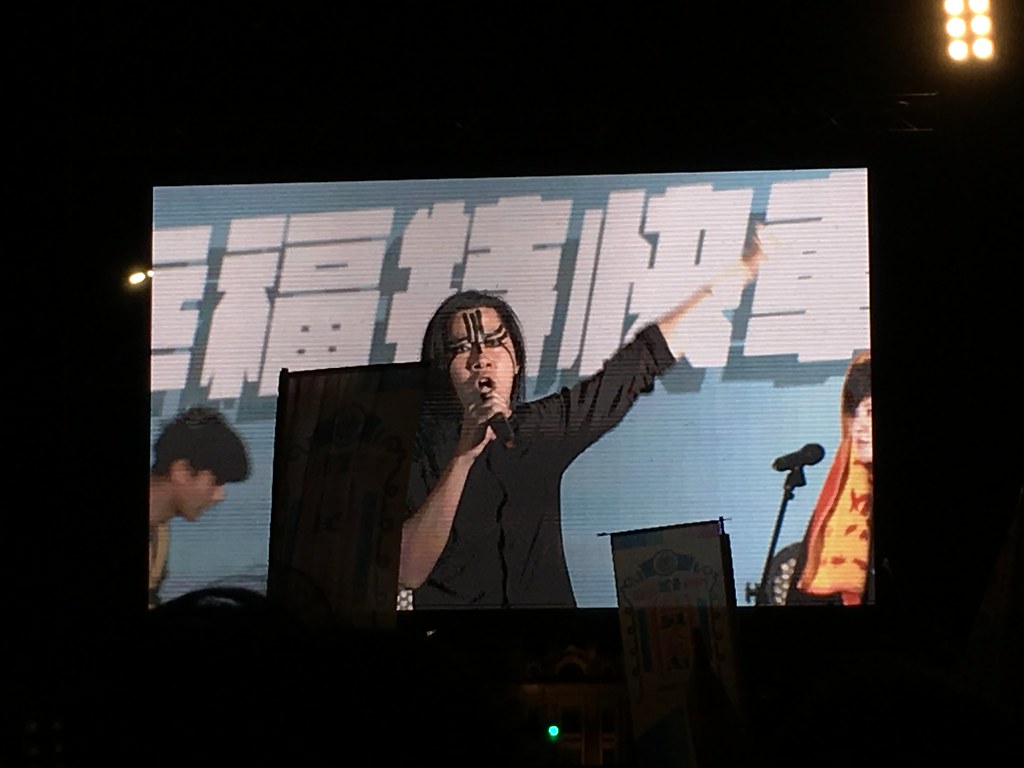 |
| Sexy Legislator and Chthonic frontman Freddy Lim, performing at the Taipei pro-marriage equality rally on December 18th in support of three pro-LGBT referendums |
Hong Kong continues its unwilling slide into authoritarianism at the hands of China with the cancellation of a performance by Taiwanese black metal band and all-around great musical act Chthonic. There had been talk on Facebook by the band that it might perform without its frontman/vocalist, Freddy Lim, but even that plan seems to have been cancelled.
Update: apparently Freddy's visa was denied because he lacks "special skills" that are "not available in HKSAR". Freddy responded by saying he was "practicing cartwheels and backflips" (to be better qualified to work in Hong Kong).
This is obviously nonsense. Chthonic has performed in Hong Kong before; being denied now points to growing CCP influence there, not any 'lack of special skills'. I personally remember Hong Kong as being far more open just a few years ago. Since then, political parties not aligned with China have been targeted and banned, with activists and elected legislators from those parties jailed. While technically freedom of speech remains a right that Hong Kongers may enjoy, in practice that's no longer the case: remember all those bookstores that sold reading material banned in China, specifically books critical of the CCP and its top officials? Those are gone now (though you can still buy the books from street vendors).
It also points to the growing political clout of Chthonic frontman and sexy legislator Freddy Lim, who (according to the article above) was denied a visa to Hong Kong after becoming an elected member of the legislature through the New Power Party. Lim had been to Hong Kong before, as well.
And that brings me to my main point: authoritarians have crap taste in music. I'm sorry, they just do. Chthonic was denied because of what they stand for: they are very pro-independence, and their music is steeped in Taiwanese history and folklore. They don't even sing in Mandarin, and they stand for a number of progressive causes including marriage equality. This scares the CCP - no music that makes any sort of real political statement (Communist propaganda music...doesn't count as music) is terrifying to them.

But music - good music at least - is fundamentally political. It makes a statement, or at least stands for something. Good bands stand for something, even though that might not be evident in individual songs (for example, what Ani DiFranco stands for infuses all of her music, even her love songs which don't have anything directly to do with politics. You could say the same for Joni Mitchell or even groups not immediately identified with political music like The Talking Heads.)
Music under authoritarian regimes, however, can't ever stand for anything. Only - as a friend put it - "Canto-pop and Mando-slush" are acceptable in China. Context-free gunk about only the few topics that can be rendered apolitical - mostly love songs, and a few others including absolute nonsense music - can be allowed. They all sound kind of the same and they're so lightweight, they'd blow away in a light breeze. They tend to be earworms (that's how they hide their lyrical empty calories) but are also interchangeable and, to be frank, forgettable.
So, you wonder why "Mando-slush" all sounds kind of the same, with lyrics you could literally change out for anything because they just don't matter, it's not because people in Mandarin-speaking societies aren't good at creating music or are somehow culturally uncreative. I've heard that before and it's simply not true and frankly kind of racist. It's because in China, they risk their actual lives by being truly creative and writing songs that actually mean something. Outside of China, if they want to be allowed into the lucrative Chinese market, they have to churn out the same kind of tripe. Music with meaning will simply not be allowed in.
To be fair, people tell me that China, and especially Beijing, has a thriving underground hip-hop scene, and I guess I believe them? Maybe? But unless these underground artists are actively risking being 'disappeared' by the government, I can't imagine that what they sing stands for anything, either.
As such, I've noticed that the Taiwanese music I like tends to be banned in China, by artists who don't care if their music is allowed in the market there. They make music to make music, not primarily to make money. All the Taiwanese music I don't like - the love ballad gurgling, the motivational "you can do it!" crap that thinks it's edgy because there's an electric guitar played by a guy with spiky hair, the K-pop imitators, Jay Chou - is allowed in China, and hugely popular there. And it is, to be frank, terrible. All of it. (Yes, I know other people like that stuff. I don't care.)
To sum up, if an authoritarian government finds some music acceptable, that music is probably bad. At the very least, it's the tasteless, sugary white cake of music: unsatisfying, lacking basic nutrition, and will make you metaphorically corpulent and complacent if you consume too much of it.
So, it's no wonder that of all the music in a Chinese language which is popular internationally, Chthonic is one of the best-known outside Asia, for a niche market anyway.
News reports keep calling Chthonic a well-known band "in Asia", but I'd like to point out that, in the international black metal scene, they're quite well-known outside of Asia as well. Pretty much every black metal fan I know, even if they have no connection to Taiwan, knows Chthonic. All of them say the music is top-notch, and they transcend being a 'local act' by a very wide margin. They release English versions of all of their Taiwanese-language songs, Lim has held 'ask me anything'-style live interactive videos in English.
This is because Chthonic stands for something, and they put out genuinely good music because of it. Creativity and meaning are intertwined, and cannot be separated. Without meaning, art has no weight (which might just be why so much public art is forgettable, if not terrible - when you seek not to offend anyone, you inspire no-one). And that's why the same old love ballad recycled a hundred times with lyrics that you could just make up mockingly as you go along, with the parody indistinguishable from the original, will never find as much international acclaim.
Monday, November 26, 2018
All hail the new kings, same as the old kings (or, the KMT double standard)
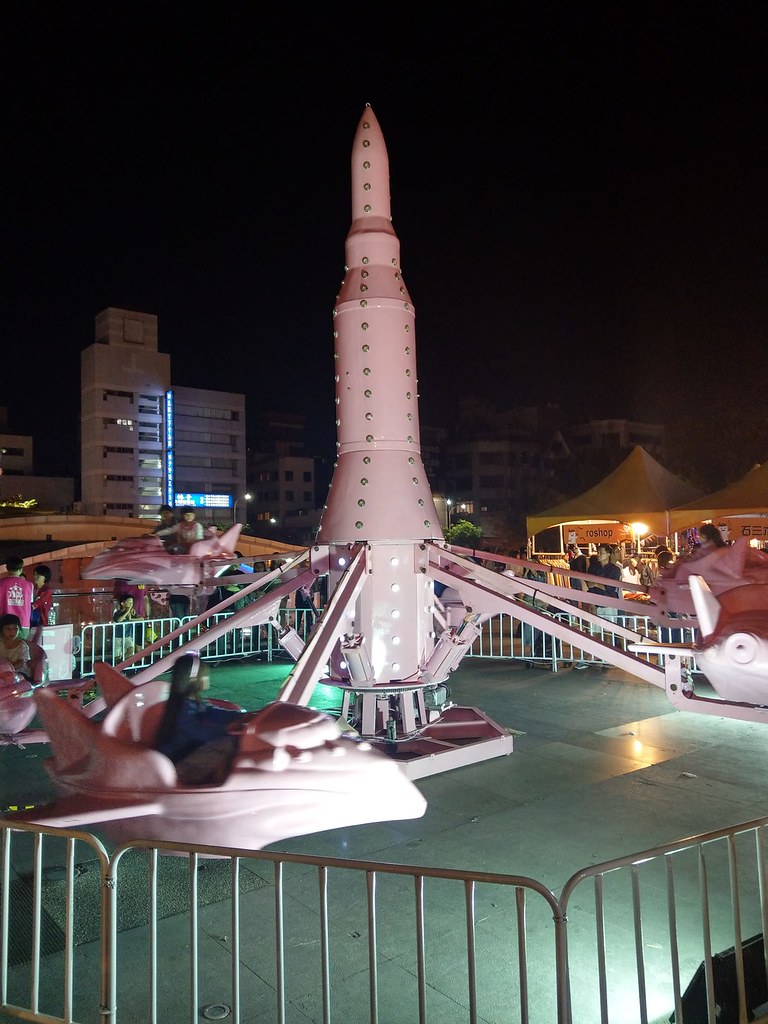 |
| You all are getting taken for a ride. You've taken this ride before, and you don't even remember that it made you puke. |
So everyone's going on about why the DPP lost so badly. It's a "rebuke" to the Tsai administration. Some are saying they weren't listening to their base (many of whom are center-right social conservative small-business owners and working-class people, generally Taiwan independence supporters). Others are saying they didn't deliver on progressive promises, so their other column of support - young Taiwanese liberals - abandoned them. Someone I know is saying that Taiwanese want a center-right society and will accept it being pro-China or pro-Taiwan. Another is saying Taiwanese vote with their wallets, and the KMT could offer more economic perks.
All of these things are true at once (though I'm not quite so sure about progressive deserters - some of them went for the NPP, true, but who else would they have voted for? The KMT? They know the KMT is even less progressive than the DPP, and voter turnout wasn't too low so they didn't stay home.)
But there's another issue which bothers the hell out of me. It's been said before, just not about this election, and yet it holds now too.
How is it that the KMT can screw up so spectacularly every time - like, every single time - and still get "a second chance" or "time for their ideas to show results", but if the DPP isn't immediately Jesus Who Descendeth From Heaven To Save Us All, they're angrily voted out before we can even see what the effects of their policies are?
Let's start with China.
ECFA was a joke - it didn't really do much for the economy except hollow out the job market as everything was moved to China (which was exactly China's intent). Exports grew more under Chen - whom China hated - than they did under Ma. Chinese tourism was a joke - it had little-to-no effect on the Taiwanese economy. It was one massive scam that made the country a noticeably worse place to live while offering no real benefit (unless cheap, tacky hotels spurting up like whiteheads across scenic areas or caravans of tour buses and the low-wage jobs they bring - but not more than that as most of the companies that own those hotels and tour/bus companies are based in China - can be called a "benefit". Which they can not.) Although it was great if you enjoyed getting locked out of purchasing train tickets.
And yet Ma got "four more years" to "give him a chance", the KMT remained strong, and didn't suffer any real wipeouts until halfway through Ma's second term when his "chance" came to fruition and it was shown to be a stinking heap of garbage, because a bunch of plucky activists drew back the curtain.
For a short while, it was clear to everyone that China's strategy was to parlay increased economic dependence into increased political integration. China didn't even try to hide this. For the briefest glimmer of a moment, people realized that the 1992 Consensus was a massive made-up turd bomb and they didn't have to agree that there was "one China" or that they were a part of it. They voted in a government to try something new.
So the DPP goes ahead and does exactly what we elected them to do, which was decrease Taiwan's economic dependence on China and pursue other strategies, while refusing to acknowledge a fabricated "consensus".
The effects were not immediate, and we always knew there would be drawbacks (Chinese money sure does look nice and smell like profit, but underneath that there's a whiff of political oppression that cannot be Febreezed away.)
And yet, because the exact drawbacks we knew would manifest did, Taiwan got mad and voted a bunch of DPPers out. We don't even know yet what the long term effect of the DPP's policies will be, because it's only been two years, and yet they didn't completely transform Taiwan into a perfect wonderland where everyone is rich. No matter that the KMT couldn't do in eight years what the DPP could not possibly have done in two. Let's have those guys back!
Now, newly-elected KMT mayors are talking about recognizing the 1992 Consensus. They will get an influx of Chinese capital for their obedience, and it will certainly smell like profit. These cities will become increasingly economically dependent on China, but will seem as though they are doing better than municipalities not governed by the KMT.
Never mind that this sets up a perfect system of economic blackmail. Do what we say, or we turn off the spigot. This isn't hyperbole or speculation. They did this with Chinese tourists to Taiwan and then spread fake news about what an economic disaster it was (it wasn't). They are doing it to Palau. They are likely to try it with Chinese students in Taiwan. They'll do it with everything from the Olympics (fuck those guys, by the way) to the Golden Horse awards.
Nevermind that we figured this out in 2014 - it's like nobody remembered the lesson. Yeah, let's vote exactly those dudes we occupied a legislature to stop back in power to do the exact thing we all went downtown to make them stop doing again, because after giving them eight years to sell out Taiwan, we couldn't completely fix it in two years.
And we won't even know how well we might have fixed it, because for all this "we gave the DPP a chance in 2016", no my dudes, you did not. Not the way you keep handing Taiwan to the KMT like they're holding the magic key when really they're holding something far more flaccid.
And there's the air pollution and the nuclear issue.
The KMT completely screwed us on air pollution, not giving a damn about it until they could hand the problem over to the DPP. Yes, we should have known under Chen Shui-bian that we needed to start investing in renewable energy technology, but it was still early then: most other nations hadn't fully begun to realize that yet, either. But it was glaringly clear that this was the direction we needed to take under Ma Ying-jeou, who promptly stuck his thumb up his ass and did jack-all about it for 8 years as the situation grew worse.
And yet the DPP gets voted out because they didn't fix air pollution in 2 years.
Everyone was willing to go ahead with the anti-nuclear activists (whom I still sort of blame for not concurrently pushing for a serious green energy policy, and who seemed happy to return to coal as long as Taiwan denuclearized) until they realized that would make air pollution worse, because again the KMT spent eight years doing jack-all about it so we had no better alternatives, and voted nuclear back in. Not that it matters: whether we denuclearize or not, air pollution here won't get better until the government takes it seriously, and neither party has taken it seriously. The only difference is the KMT gets eight years to not take it seriously, but the DPP is expected to make it all better in two.
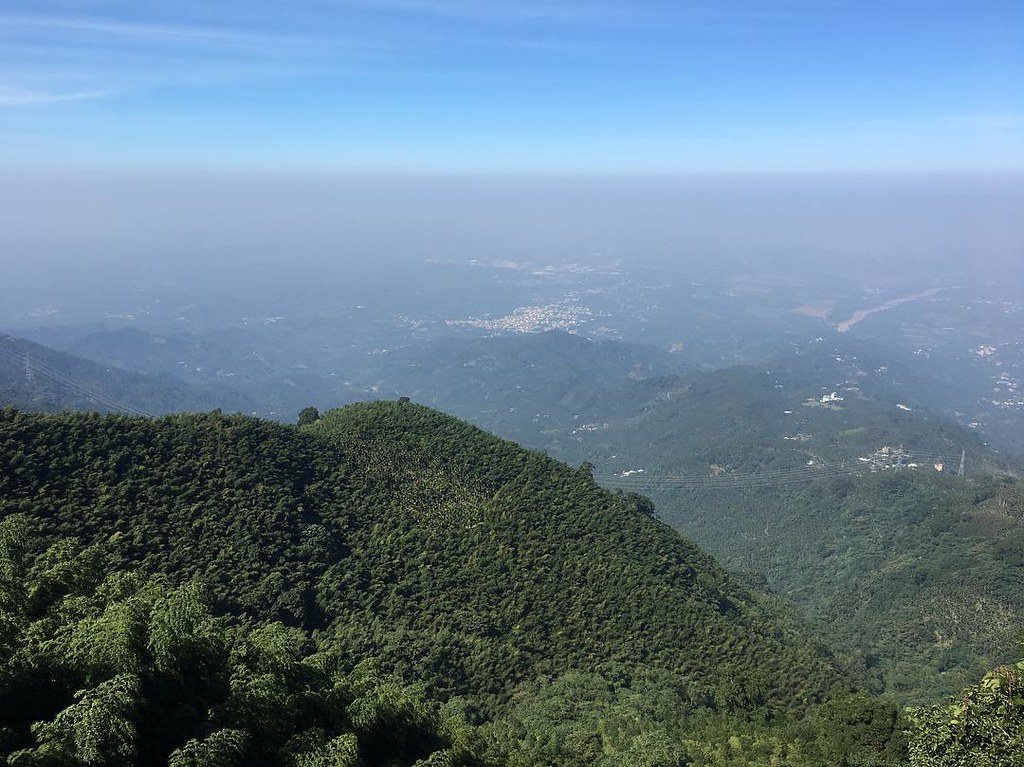 |
| This sucks, and not all of it is from China (some of it is). But to blame the DPP for this after two years when it got this way under the KMT to begin with? |
Even so, the DPP has both screwed up and shown glimmers of awareness. On one hand, pollution has gotten worse. In places like Taichung where it is especially noticeable, the government preferred to massage the air quality numbers rather than do anything, and they have been quietly reopening coal-fired plants.
On the other, I recall that until fairly recently, power generated from green energy companies could not be sold directly to consumers. So, of course, nobody was producing it because there was no money to be made (if I remember correctly, the power generated had to be first sold to Taipower). That changed not long ago under Tsai, not the KMT.
Then there's wages. Sure. Wages have been stagnating and Taiwan's minimum wage is "unjustifiable" (to quote the News Lens above).
But again, the KMT let the minimum wage stagnate for four years, then got re-elected so it could stagnate for another four. Give them a chance! We don't know how well their ideas are working! people said. Nevermind that it was blatantly obvious that they didn't give a damn, because big bosses were doing alright and if they weren't they could just go to China.
The DPP raises the minimum wage more than it has risen in decades, and yet Tsai gets a "rebuke" for low wages. Do they really think wages will rise more under the KMT, when they didn't for eight goddamn years?
And I could say something similar about labor laws. I'm not a fan of the 2nd round of labor law amendments, and the first round weren't great either. But, they were a substantial improvement over KMT policy, and yet workers immediately cried out that it wasn't enough, while bosses immediately cried out that they'd no longer be able to treat workers like slaves, and that will make us less competitive! WE NEED SLAVES!
The KMT knew this issue was a hornet's nest, so they basically threw workers under the bus for eight years because the Boss Class was enough to get them elected. The DPP made a mediocre attempt at addressing the problem, and suddenly they're the devil fucking incarnate.
And finally there's marriage equality.
Yes, the DPP wimped out on this one. Yes, they failed to grow a spine, and they lacked moral courage. They backed away from campaign rhetoric and disillusioned their progressive voters, thinking that their bigot voters could carry them through.
And yet, among them there are supporters of equality. Some DPP legislators have been trying to get it on the docket for quite a long time, before it was a mainstream topic. At least they were willing to try out the rhetoric, and I do believe their goal was to wait out the clock so the civil code would automatically be re-interpreted, knowing full well that a.) if this ever came to a vote, conservative Taiwanese would be mobilized by well-organized hatemongers and vote against it (and lo, that is exactly what happened), and b.) passing a 'separate law' would not satisfy progressive voters.
What did the KMT do? Eight years of not giving a shit about marriage equality, that's what (to be fair, twelve ago the mainstream wasn't about marriage equality, so this isn't just an issue of an uncaring KMT. Society at large didn't care, either). Sure, since then, a few pro-equality KMT legislators have made themselves known (though offhand I can only recall the name of one), but all-in-all it was clear in this election cycle that anti-equality campaigners and the KMT are hand-in-hand (and, again, I suspect this might be the result of a quiet alliance, not a coincidental convergence of interests).
So progressives, fine, you're mad at the DPP for being such cop-outs. I get it. But you know the KMT is going to be worse, and yet you let the DPP get slammed because they couldn't convince the more conservative elements of society to go along. Yes, they could have tried harder, but the KMT was and is never even going to try.
You blame the DPP for every single thing - even things that weren't their fault, from the nuclear/coal conundrum to the Taipei Dome. You voted Hau out because of the Taipei Dome, after giving him eight years to sit there jacking it in his office. Ko (not DPP but the point is, he's not KMT) just barely gets re-elected because he couldn't fix Hau's corrupt mess in four years, despite marked improvements in the city, from real bike lanes to an improved North Gate (though to be clear, I'm not a fan of Ko and absolutely do not want him to be president.) Yet you give credit to the KMT for things they didn't even do (the KMT routinely takes credit for improving MRT access in New Taipei, but as a friend pointed out, those plans were laid in the Chen administration) and keep re-electing them.
This has a basis in history too. The KMT stole from Taiwan for two generations, and then got a second chance in 2008 because they've "changed" (HOW DID THEY CHANGE EXACTLY?) Chen Shui-bian - admittedly not the greatest guy - steals a fraction of that and suddenly the DPP is evil and untouchable for more than half a decade.
I get that expectations are higher - I keep hearing "well we expect that from the KMT but we wanted better from the DPP", but then give them a chance to do better just like you do with the KMT!
Mark my words. The KMT is going to do a terrible job, because they always do. And yet they will get "a second chance", because they always do. They won't be able to fix pollution or wages - they won't even try to fix wages - they'll just tell you all to go to China for work. Same country anyway, har har har. Even if they could fix pollution, they won't try to do that either, because the only punishment for being lazy moneygrubbing China-fluffing wankstains the first time around was two years in the wilderness.
Oh but they will make Taiwan economically dependent on China, bring back attempts to force Taiwanese to say publicly that they are Chinese (that is what the 1992 Consensus is, after all), and work with Christian hate groups to ensure that the constitution can never be interpreted to allow marriage equality.
There will be a big battle for the presidency, and a peace agreement with China because we never learn our lesson, and we will become Hong Kong with no freedom or autonomy. People will start to believe - because the KMT will tell them to - that Chinese money is helping Taiwan, even if it isn't. They'll start to believe peace can be negotiated with the power that seeks to annex them. They'll give them "another chance".
And unless some new Sunflowers come 'round to teach us all a lesson again, we'll become Hong Kong. And then, when we don't comply, Xinjiang. The world will do nothing, because that's what it always does. Some people will even believe this is better for you or that it's a step in the right direction toward "peaceful reunification". The KMT won't even try to stop this disinformation leaking into international political discourse, because it serves their purposes for the rest of the world to be misinformed about Taiwan.
After a brief, imperfect but also glorious window when the world seemed to be finally waking up to the reality of democratic Taiwan, they will be yet again hypnotized into believing that the Taiwanese want the 1992 Consensus or "Chinese Taipei". Doesn't matter that that's not true, and it's a hack interpretation to believe that it is (voting out of fear of IOC retribution is not the same as embracing "Chinese Taipei".)
And then we'll be dead and Taiwan will be gone.
Tuesday, October 23, 2018
This Week in CHINA TENSIONS!!!!
Apparently the old way of avoiding saying that China creates tensions through its own aggressive expansionism and weaponized use of 'hurt feelings' (and century-out-of-date victimhood - more on that later) isn't harvesting as many clicks as it used to. Perhaps passive voice (those tensions - they were just...raised!) isn't thirsty enough, perhaps simply attributing these tensions to everyone but China wasn't interesting anymore.
Now, we need BIGGER and STRONGER verbs to THROTTLE readers' attention because REPORTING THE SITUATION ACCURATELY is apparently not enough.
The accurate situation: China is engaging in territorial expansionism using fabricated historical narratives to justify it. The "tensions" over Taiwan are created by China, and are a policy choice on the part of China. They are not - as someone on my twitter feed put it - a "natural reaction" to what others do. China does not suffer because the US sent warships through the Taiwan Strait. The strait is considered international waters (and this has been pointed out before). Nothing changes in China when a country sends a warship through international waters.
If anything, China is the one creating the situation where a response is necessary. If China hadn't been slowly pushing the envelope towards a world where it controlled Taiwan and the Taiwan Strait as well, the US wouldn't have felt it necessary to demonstrate that it had the right to sail ships in all international waters.
That means that China is not only choosing to respond to this with "OMG that means tensions!" but in fact that they created the tensions to begin with.
If the media reported that accurately, here is what these completely ridiculous headlines and tweets would actually look like:
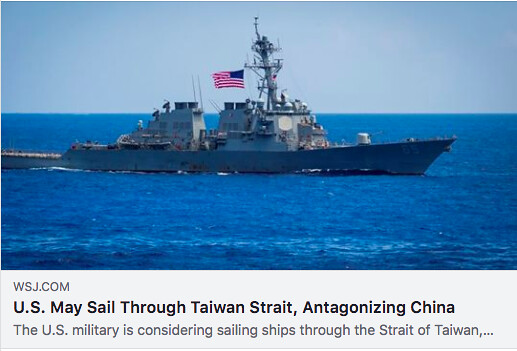
Ooh, a new one - "antagonize"! I guess simply "causing tensions" wasn't eye-catching enough.
But it should be:
"US May Sail Through Taiwan Strait In Response To Chinese Antagonism In Region"
(This was later changed to "provoking", which isn't much better.)
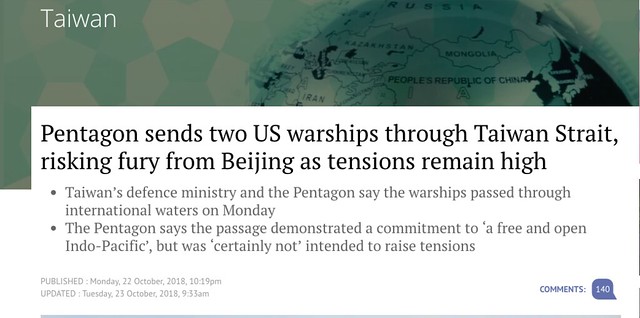
Wow, fury! Really? Actual fury? What has China got to be "furious" about when another country sails ships in international waters, unless it is choosing to be furious?
Nope, let me fix that for you:
"Chinese aggression against Taiwan risks U.S. fury, Pentagon sends two warships into nearby international waters"
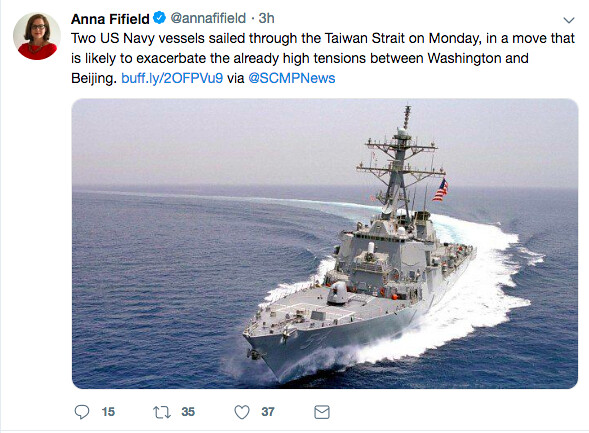
EXACERBATE! Hah.
I'm especially saddened by this tweet, because the Beijing bureau chief of the Washington Post should understand the region better than this. Anyway, her tweet would more accurately read:
"Two US Navy vessels sailed through the Taiwan Strait on Monday, in a move that warns China against further exacerbating tensions with Taiwan"
Let me add - "already high tensions" - where did these tensions come from? Who created them? In whose interest is it for those tensions to remain high? Who keeps getting angry?
You know the answer is "China", so why does your tweet imply that the U.S. is to blame?
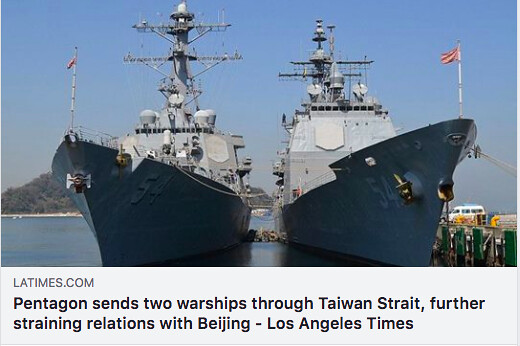
Oh man. LA Times finally got someone other than Ralph "I hate Taiwan" Jennings to write about Taiwan, and they still come out with this garbage. What's even more annoying is that the most salient quote is in the article itself:
“The ships’ transit though the Taiwan Strait demonstrates the U.S. commitment to a free and open Indo-Pacific,” said Lt. Rachel McMarr, a spokeswoman for the U.S. Pacific Fleet. “The U.S. Navy will continue to fly, sail and operate anywhere international law allows.”
So, if you have to report on this at all (which you don't), maybe try:
"Pentagon sends two warships through Taiwan Strait as warning to Beijing to cease raising tensions"
or even:
"Why is China angry about the Pentagon sending two warships through international waters?"
And your laugh of the day:
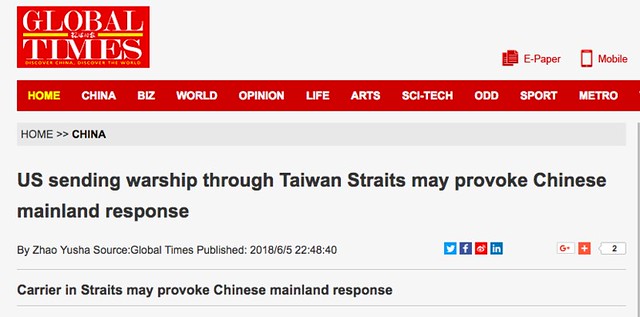
China provoked a US response, not the other way around. But this is Global Times, who cares. But let's play anyway:
"China's actions in Taiwan Straits [sic] provoke US response of sending warship through international waters"
* * *
This worries me, because I fear the way these things are being reported won't change. Newly-minted journalists will feel they have to stick to the old lines to get published and won't insist on accurate wording, editors will continue to edit pieces on topics they know nothing about, and actual bureau chiefs (jesus) will EXACERBATE the problem by sharing news that makes it seem as though this situation is everyone's fault but China's.
They know better: like with Chinese "tensions", it's a choice to publish headlines this obtuse and backwards.
It also worries me because China will absolutely continue to use this to their advantage, and nobody will say anything. Then the US will respond to China's actions. Or Taiwan will. And everyone will jump on that, pointing fingers at the U.S. and Taiwan and saying "these guys are exacerbating tensions!"
It makes it impossible to respond to China, when China's own actions are not held up to the same standard. When they are not objectively considered.
Again, this is a choice. They know better. They are helping an authoritarian regime look like a victim, and therefore helping them expand not only their territorial claims but their attempts to export authoritarianism. They are aware of this. Yet they continue to do it.
And, finally, it worries me because China is taking its cues from nobler causes in the West. It's looking at how we legitimately talk about historical victimization and how that affects modern society (think: arguments about inheriting tangible and intangible generational wealth vs. inheriting trauma while still being discriminated against).
It's taking that - a real, legitimate argument - and twisting it around to weaponize its own "century of humiliation". It is the most powerful actor in Asia, has taken by force most of the territory it says it wants (which is mostly full of people with distinct cultural backgrounds who don't want to be ruled by China), and is an economic powerhouse.
In whatever ways China was victimized in the past - and it certainly was - its claim on Taiwan is not an extension of that. Not historically, not culturally, not legally. The government that rules China now has never ruled Taiwan, and if we're going to talk "antiquity", has only in recent history even considered that Taiwan could possibly be Chinese.
Let me say that again for the people in the back: even if a historical argument supported China's claims on Taiwan, which it doesn't, it wouldn't matter. Taiwan has a culture, sense of history and identity that differs from China now, and they do not want to be a part of China ever. China doesn't get to have an opinion on the future of a territory it does not hold, and which its current government (with its current borders) has never held.
China can whine and cry and play victim, but the fact that it does not have Taiwan is not a facet of its historical victimhood. And even if it were, there is no just world in which the lives of 23.4 million people are an acceptable form of reparations.
And yet all of these headlines about 'antagonizing', 'exacerbating' and 'provoking' China make it sound as though it is. As though China is still being bullied like it's the Opium Wars or something. As though it isn't the one upping the ante, with Taiwan and the U.S. responding.
This is the best possible headline, by the way:
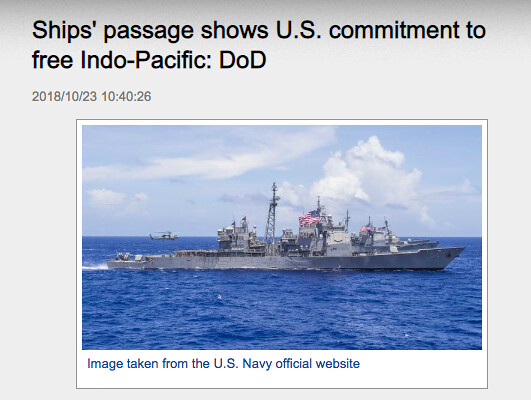
It's from Focus Taiwan so will obviously show Taiwan's point of view, but that happens to also be the accurate point of view in this case, even incorporating a quote from a U.S. military spokesperson.
You know this, journos, yet you report all that other garbage anyway.
Seriously. Quit it.
Now, we need BIGGER and STRONGER verbs to THROTTLE readers' attention because REPORTING THE SITUATION ACCURATELY is apparently not enough.
The accurate situation: China is engaging in territorial expansionism using fabricated historical narratives to justify it. The "tensions" over Taiwan are created by China, and are a policy choice on the part of China. They are not - as someone on my twitter feed put it - a "natural reaction" to what others do. China does not suffer because the US sent warships through the Taiwan Strait. The strait is considered international waters (and this has been pointed out before). Nothing changes in China when a country sends a warship through international waters.
If anything, China is the one creating the situation where a response is necessary. If China hadn't been slowly pushing the envelope towards a world where it controlled Taiwan and the Taiwan Strait as well, the US wouldn't have felt it necessary to demonstrate that it had the right to sail ships in all international waters.
That means that China is not only choosing to respond to this with "OMG that means tensions!" but in fact that they created the tensions to begin with.
If the media reported that accurately, here is what these completely ridiculous headlines and tweets would actually look like:

Ooh, a new one - "antagonize"! I guess simply "causing tensions" wasn't eye-catching enough.
But it should be:
"US May Sail Through Taiwan Strait In Response To Chinese Antagonism In Region"
(This was later changed to "provoking", which isn't much better.)

Wow, fury! Really? Actual fury? What has China got to be "furious" about when another country sails ships in international waters, unless it is choosing to be furious?
Nope, let me fix that for you:
"Chinese aggression against Taiwan risks U.S. fury, Pentagon sends two warships into nearby international waters"

EXACERBATE! Hah.
I'm especially saddened by this tweet, because the Beijing bureau chief of the Washington Post should understand the region better than this. Anyway, her tweet would more accurately read:
"Two US Navy vessels sailed through the Taiwan Strait on Monday, in a move that warns China against further exacerbating tensions with Taiwan"
Let me add - "already high tensions" - where did these tensions come from? Who created them? In whose interest is it for those tensions to remain high? Who keeps getting angry?
You know the answer is "China", so why does your tweet imply that the U.S. is to blame?

Oh man. LA Times finally got someone other than Ralph "I hate Taiwan" Jennings to write about Taiwan, and they still come out with this garbage. What's even more annoying is that the most salient quote is in the article itself:
“The ships’ transit though the Taiwan Strait demonstrates the U.S. commitment to a free and open Indo-Pacific,” said Lt. Rachel McMarr, a spokeswoman for the U.S. Pacific Fleet. “The U.S. Navy will continue to fly, sail and operate anywhere international law allows.”
So, if you have to report on this at all (which you don't), maybe try:
"Pentagon sends two warships through Taiwan Strait as warning to Beijing to cease raising tensions"
or even:
"Why is China angry about the Pentagon sending two warships through international waters?"
And your laugh of the day:

China provoked a US response, not the other way around. But this is Global Times, who cares. But let's play anyway:
"China's actions in Taiwan Straits [sic] provoke US response of sending warship through international waters"
* * *
This worries me, because I fear the way these things are being reported won't change. Newly-minted journalists will feel they have to stick to the old lines to get published and won't insist on accurate wording, editors will continue to edit pieces on topics they know nothing about, and actual bureau chiefs (jesus) will EXACERBATE the problem by sharing news that makes it seem as though this situation is everyone's fault but China's.
They know better: like with Chinese "tensions", it's a choice to publish headlines this obtuse and backwards.
It also worries me because China will absolutely continue to use this to their advantage, and nobody will say anything. Then the US will respond to China's actions. Or Taiwan will. And everyone will jump on that, pointing fingers at the U.S. and Taiwan and saying "these guys are exacerbating tensions!"
It makes it impossible to respond to China, when China's own actions are not held up to the same standard. When they are not objectively considered.
Again, this is a choice. They know better. They are helping an authoritarian regime look like a victim, and therefore helping them expand not only their territorial claims but their attempts to export authoritarianism. They are aware of this. Yet they continue to do it.
And, finally, it worries me because China is taking its cues from nobler causes in the West. It's looking at how we legitimately talk about historical victimization and how that affects modern society (think: arguments about inheriting tangible and intangible generational wealth vs. inheriting trauma while still being discriminated against).
It's taking that - a real, legitimate argument - and twisting it around to weaponize its own "century of humiliation". It is the most powerful actor in Asia, has taken by force most of the territory it says it wants (which is mostly full of people with distinct cultural backgrounds who don't want to be ruled by China), and is an economic powerhouse.
In whatever ways China was victimized in the past - and it certainly was - its claim on Taiwan is not an extension of that. Not historically, not culturally, not legally. The government that rules China now has never ruled Taiwan, and if we're going to talk "antiquity", has only in recent history even considered that Taiwan could possibly be Chinese.
Let me say that again for the people in the back: even if a historical argument supported China's claims on Taiwan, which it doesn't, it wouldn't matter. Taiwan has a culture, sense of history and identity that differs from China now, and they do not want to be a part of China ever. China doesn't get to have an opinion on the future of a territory it does not hold, and which its current government (with its current borders) has never held.
China can whine and cry and play victim, but the fact that it does not have Taiwan is not a facet of its historical victimhood. And even if it were, there is no just world in which the lives of 23.4 million people are an acceptable form of reparations.
And yet all of these headlines about 'antagonizing', 'exacerbating' and 'provoking' China make it sound as though it is. As though China is still being bullied like it's the Opium Wars or something. As though it isn't the one upping the ante, with Taiwan and the U.S. responding.
This is the best possible headline, by the way:

It's from Focus Taiwan so will obviously show Taiwan's point of view, but that happens to also be the accurate point of view in this case, even incorporating a quote from a U.S. military spokesperson.
You know this, journos, yet you report all that other garbage anyway.
Seriously. Quit it.
Subscribe to:
Posts (Atom)

